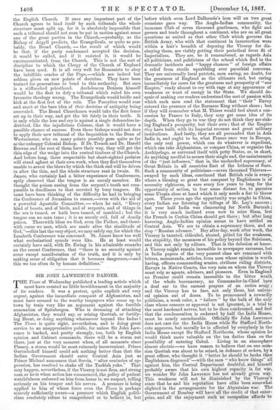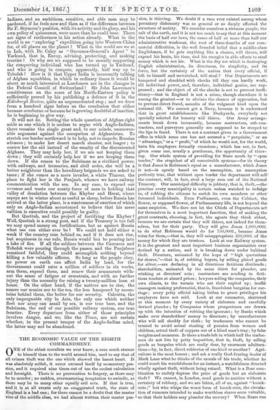SIR JOHN LAWRENCE'S DANGER.
THE Times of Wednesday published a leading article which must have created no little bewilderment in the majority of its' readers. It was a protest, quite explicit and very urgent, against the immediate conquest of Afghanistan, and must have seemed to the worthy taxpayers who come up to town by train very like an argument against the forcible annexation of Spitzbergen. Who is dreaming of attacking Afghanistan, they would say, or seizing Quettah, or fortify- ing Herat, or doing anything whatsoever beyond the Indus ? The Times is quite right, nevertheless, and is doing great service to an unappreciative public, for unless Sir John Law- rence is backed, and pretty strongly, too, both by English opinion and Cabinet commands, there will be a storm out there, just at the very moment when, of all moments since Plas.sey, a storm would be most ruinously inconvenient. Prince Gortschakoff himself could ask nothing better than that the Indian Government should enter Central Asia just as Prince Michael announces that Servia, after centuries of op- pression, has resolved to shake off the Turkish yoke." That may happen, nevertheless, if the Viceroy is not firm, and strong man as he is when action has commenced, the policy of patient watchfulness enforced on him from home is, we suspect, telling seriously on his temper and his nerves. A pressure is being applied to him of whose force even the Times is perhaps scarcely sufficiently aware—a pressure which English politi- cians resolutely refuse to comprehend or to believe in, but before which even Lord Dalhousie's iron will on two great occasions gave way. The Anglo-Indian community, the immense Club of seven thousand gentlemen, who fight and govern and trade throughout a continent, who are on all great questions as united as that other Club which governs the British Army, who with that continent in insurrection were within a hair's breadth of deposing the Viceroy for dis- obeying them, are visibly getting their periodical fever fit of Imperialism, They are, be it remembered, as regards Asia all politicians, and politicians of the school which find in the dramatic incidents and "happy chances" of foreign affairs a relief from sterile squabbling over parochial concerns. They are universally local patriots, men caring, no doubt, for the greatness of England as the ultimate end, but caring immediately far more for the greatness and prosperity of "our Empire," ready almost to cry with rage at any appearance of weakness or want of energy in the State. We should de- spair of making our readers understand the sort of passion with which such men read the statement that " their " Envoy entered the presence of the Burmese Bing without shoes ; but if they will remember what M. Thiers would feel about a con- cession by France to Italy, they may get some idea of its depth. When they go to war they do not think they are risk- ing England's prosperity, but their own ; that of the Empire they have built, with its Imperial revenue and great military institutions. And lastly, they are all persuaded that in Asia India is, and ought to be, what France once was in Europe, the only real power, which can do whatever is expedient, which can take Afghanistan, or conquer China, or organize the Archipelago, or surround itself with petty States, or, in short, do anything needful to secure their single end, the maintenanie of the "just influence," that is, the unchecked supremacy, of Great Britain in all countries East of the Isthmus of Suez. Such a community of politicians—seven thousand Thierses- swayed by such ideas, convinced that British rule is every- where a blessing so great that conquest by Englishmen is of necessity righteous, is sure every few years to long for the opportunity of action, to fear some distant foe, to perceive some Utopia close at hand which it only needs a fiat to throw open. Three years ago the opportunity was sought in China, every Indian ear listening for tidings of Mr. Lay's success ; last year half India was clamouring for North Burmah ; it is very much inclined even now to seize Siam, lest the French in Cochin China should get there ; but after long hovering, Anglo-Indian opinion seems to have settled on Central Asia. We are to obtain a supremacy there, and so stop "Russian advance." Day after day, week after week, the Viceroy is taunted, ridiculed, abused, pitied for the weakness, the stupidity, the meanness of his policy beyond the Suleiman, and this not only by editors. That is the delusion at home. A Viceroy might remain insensible to newspaper sarcasms, but in India papers of the very poorest class are crammed with letters, memoranda, articles, from men whose opinion is worth having, officers commanding armies, civilians ruling districts, Envoys in Native Courts, the very men on whom the Viceroy must rely as agents, advisers, and pioneers. Even in England no Premier could remain insensible to the bitter wrath of the whole bureaucracy, no Commander-in-Chief turn a deaf ear. to the earnest prayers of an entire army ; and the Viceroy has to face, not only these, but univer- sal opinion out of doors. To be pronounced a cowardly politician, a weak ruler, a "failure" by the bulk of the only class whose censure or approval is not ignorant, is a trial to the most hardened nerves, but to be thus condemned, and feel that the condemnation is endorsed by half the India House, must be nearly unendurable. Officially Sir John Lawrence does not care for the India House while Sir Stafford North- cote approves, but morally he is affected by everybody in the India House except Sir Stafford Northcote, whose opinion he would think more valuable on the tea duties than on the possibility of entering Cabul. Living in an atmosphere almost electric—we have reason to believe that on one occa- sion Qaettah was about to be seized, in defiance of orders, by a great officer, who thought it "better he should be broke than Englishmen disgraced"—with the men "who know things" all against him, the Central Department doubtful, and himself probably aware that his own highest capacity is for war, we wonder Sir John Lawrence has not already given way. This weakness will not be diminished by the Viceroy's sense that he and his reputation have alike been somewhat slighted in the arrangements for the Abyssinian war. The Government of Bombay will have all the credit of that enter- prise, and all the enjoyment such an occupation affords to Indians, and an ambitious, sensitive, and able man may be pardoned, if he feels now and then, as if the difference between Sir F. Seymour's position, with its activity and its glory, and his own policy of quiescence, were more than he could bear. There are signs of restlessness in his action already. What in the world is an " exploring " expedition going into Western China for, of all places on the planet ? What in the world are we at in Leh, with Dr. Caley as "Governor-General's Agent" in Yarkund, that is, Envoy, advising, protecting, and making treaties ? Or why are we supposed to be morally supporting the conquering individual who has turned up in Yarkund, and who is going to conquer, apparently, half way up to Tobolsk ? How is it that Upper India is incessantly talking of Afghan squabbles, in which in ordinary times it would be about as much interested as Londoners are in the changes in the Federal Council of Switzerland ? Sir John Lawrence's sensitiveness on the score of his North-Eastern policy is sufficiently proved by his publishing a defence of it in the Edinburgh Review, quite an unprecedented step ; and we draw from a hundred signs before us the conclusion that either because overborne or because he is growing doubtful of inaction, he is beginning to give way.
It will not do. Setting the whole question of Afghan right aside as one which it is useless to argue with Anglo-Indians, there remains the single great and, to our minds, unanswer- able argument against the occupation of Afghanistan. To stretch our border northward is to help, not to impede, Russian advance • to make her desert march shorter, not longer ; to ensure her the aid instead of the enmity of the discontented Afghans. They may help her, if we are not keeping them down ; they will certainly help her if we are keeping them down. If she comes to the Suleiman as a civilized power, with railways, and treasuries, and civil order, she will be a better neighbour than the hereditary brigands we are asked to tame ; if she comes as a mere invader, a white Timm., the place to fight her is the Punjaub, whence we have railway communication with the sea. In any case, to expend our revenue and waste our scanty force of men in holding that valley of desolation between the Khyber and Herat, where sepoys are in winter about as useful as sheep, before Russia has arrived at the latter place, is a wantonness of exertion of which only an Anglo-Indian accustomed to believe that his mere volition is executive could possibly be guilty.
But Quettah, and the project of fortifying the Khyber ? Well, Quettah is a strong post, and if the Treasury is too full we may spend money on fortifications, but as against Russia what use can either ever be ? We could not hold either a week if the country rose behind us, and if it does not rise, but acquiesces in our rule, Russia would but be pouring into a lake of fire. If all the soldiers between the Caucasus and Tobolsk were pouring through the passes, and the Panjabees remained faithful, they could accomplish nothing beyond killing a few valuable officers. So long as the people obey, no power on earth can affect India by land, for the Government could raise a million of soldiers in six weeks, arm them, expend them, and renew their armaments with- out the sense of fatigue or overstrain, and with no further injury than the necessity for raising a twenty-million loan at home. On the other hand, if the natives are to rise, the nearer our armies are to the sea, the less hampered by moun- tains behind them, the better for our security. Calcutta, the only impregnable city in Asia, the only one which neither fleet nor army can assail by sea, is our true base, and the Suleiman, the end of our possible railway system, our true frontier. Every departure from either of those principles involves danger, and we, like the Times, are not certain whether, in the present temper of the Anglo-Indian mind, the latter may not be abandoned.







































 Previous page
Previous page